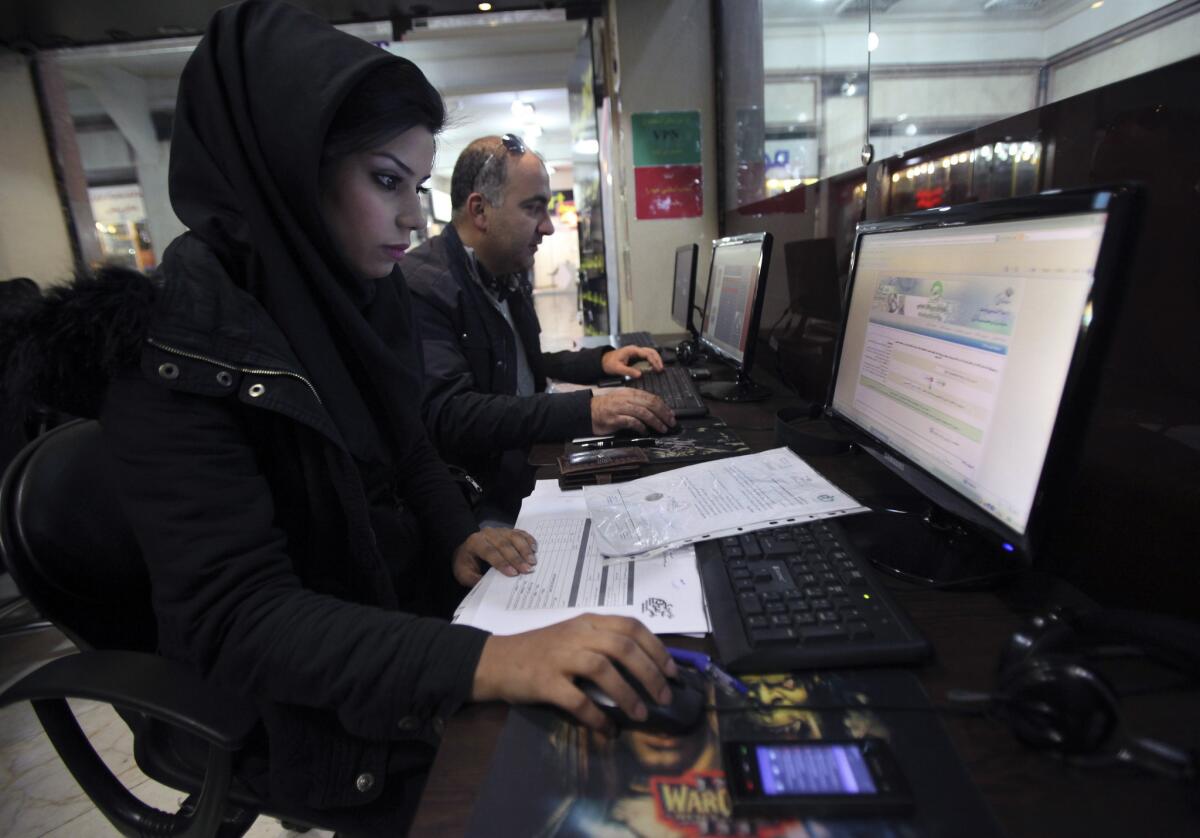When Iran blocked the internet, tech experts in the U.S. tried to hack a solution. Here’s why they couldn’t

TEHRAN — When Iranian authorities recently imposed a near-total internet blackout for almost a week to help quell massive street protests, U.S.-based tech entrepreneur Nima Fatemi bolted into action.
Fatemi and other security experts have been finding ways around Iranian censors since 2009, when authorities first blocked social media websites such as Twitter and Facebook as a means to curb unrest after a disputed presidential election.
Yet despite working around the clock, Fatemi and nearly 20 fellow internet analysts across the U.S. were unable, for the first time, to circumvent the censors.
“We were overworked and burned out,” he said. “I know so many people who didn’t sleep.”
For years, Iranian authorities tried to clamp down on how citizens used the internet but struggled to make great strides. This time, though, U.S. sanctions may have inadvertently played into their hands.
As Silicon Valley-based tech companies have increasingly blocked Iranians from their services in order to comply with President Trump’s sanctions, Iran has been able to expand its grip over the internet, analysts say.
The November blackout had significant repercussions.
Not only did it deter protesters from mobilizing and limit the flow of information about the deadly unrest — the worst in four decades, resulting in more than 200 deaths — it also put business deals on hold and left thousands of people with lost wages.
Iran’s decade-long blackout effort, known as the “national information network,” is a state-controlled and censored version of the global internet, giving officials the power to choose, when they want, to separate international internet traffic from that within Iran.
All Iranians connect to the international internet through Iran’s Telecommunication Infrastructure Co. — which operates under the Ministry of Communications and distributes internet services through providers that then sell to individuals. The setup, in place for decades, ensures that Iranian authorities can block the international internet.
To successfully diminish dependence on the global web, the Islamic Republic had to develop domestic networks and to persuade millions of Iranians to use these platforms. The government provided incentives, such as reduced prices, but getting the public to shift proved difficult.
Despite higher prices for the international internet, Iranians overwhelmingly preferred to have their servers managed abroad to bypass potential government surveillance.
That started to change when Trump reimposed economic sanctions last year after withdrawing from Iran’s landmark 2015 nuclear deal with world powers. In an effort to comply rather than mount a challenge over digital rights, tech companies with platforms and services that Iranians relied on, including Google App Engine, Digital Ocean and GitLab, started banning Iranian users.
Iranians were thus left with little recourse but to switch to the government-run network, said Amir Rashidi, an internet security researcher at the New York-based Center for Human Rights in Iran.
“You either shut down your business or use Iran’s national infrastructure and services,” Rashidi said.
Two years ago, experts said, when major Iranian companies were still using international internet services, the government decided not to use a draconian cutoff to minimize collateral damage from disconnecting the country from the global internet.
“The whole country would have collapsed because most people and industries still used international internet infrastructure and services,” Rashidi said.
This time, though, authorities began to diminish internet connectivity soon after protests took hold across Iran on Nov. 15, when President Hassan Rouhani announced an increase in gasoline prices of as much as 50% to help fund additional government assistance to 60 million impoverished Iranians.
Tens of thousands of Iranians from dozens of cities took to the streets and, before the internet blackout, videos and photos shared online showed largely peaceful demonstrations devolving into violence when security forces arrived on the scene.
When internet connectivity came to a near complete halt a day later, the only exceptions were for people in such critical industries as banking and hospitals.
Analysts said that Iran blocked 95% of international internet connectivity for nearly one week; across Iran, some reported having access to domestic websites even as the outside world was blocked.
“We couldn’t find a way to bring a mass of people back online,” Fatemi said. “All the techniques we used only worked for a small number of people.”
Kaveh Azarhoosh, a senior researcher for Small Media, a London-based digital security lab, said Iran’s long-standing efforts to localize the internet coupled with U.S. sanctions made it nearly impossible for digital rights activists to provide Iranians with tools around the internet blackout, such as VPNs, which allows users to mask their web browsing through unblocked servers.
“During times like this it pains me because all the warning signs were there,” Azarhoosh said. “Over the last two years we have seen a greater number of tech companies closing services to Iranians and citing sanctions.”
The internet is considered a lifeline between Iranians and the diaspora. Millions depend on international social messaging apps, such as WhatsApp and Telegram, to stay in touch with friends and family.
But with the internet shutdown, people with loved ones in Iran had no way of knowing whether their friends and family were safe.
Panic and stress spread, particularly in California, home to more than 40% of the roughly half a million people of Iranian ancestry living in the U.S., according to the U.S. Census Bureau.
Niki Cyrus, a 28-year-old Los Angeles native who is now a graduate student at Duke University, said that it took more than a week before she heard from her father, who was visiting family in Tehran.
“When he called I was in class so I couldn’t answer,” she said while sitting with a friend at a cafe during a recent visit to Los Angeles.
What little information trickled out of Iran painted a grim picture. Videos circulating on social media showed security forces brutally cracking down on demonstrators — and in at least one instance firing live ammunition onto crowds.
It took 10 days for the extent of the Islamic Republic’s violent and widespread clampdown to emerge. At least 208 people were killed, said Michelle Bachelet, the United Nations high commissioner for human rights.
Even though authorities managed to reduce disruption to daily life with domestic messaging apps and services remaining available — security experts said that the blackout still had major consequences.
Mohsen Jalalpour, former head of Iran’s Chamber of Commerce, told the news agency Khabaronline that the internet blackout cost the Iranian economy $1.5 billion. Netblocks, a watchdog organization that has been tracking the outage in Iran, reported that the loss was about $2.5 billion.
For Amir Hasani, a Tehran-based businessman who works as a foreign exchange operator for a company in the United Arab Emirates, the internet outage cost a week’s worth of wages.
“I could not work and do any single foreign exchange,” Hasani said. “Trump worsened our already bad situation by adding new sanctions in 2018.”
The sudden blackout also put the brakes on companies that were in the middle of international business deals. Such was the case for Sohrab, who was finalizing a deal with a foreign company to distribute board games made in Iran.
The 31-year-old, who didn’t want to give his last name because he wasn’t authorized to speak on behalf of the company, said that after months of negotiations he had nearly sealed the deal when the internet blackout occurred.
“We didn’t want to tell the foreign company that we were having problems because we were worried that they may become scared and chicken out of working with us,” he said.
After three days without service, Sohrab asked a friend who worked for a big tech company if he could help. Because that company was dependent on access to the global internet, authorities hadn’t shut it down.
“My friend let me go to the parking lot of the company he works for and I was able to access Wi-Fi from there and used Skype,” he said. “We managed to make a deal by finding someone who had internet connection, but I know that 99% of startups or companies in the country lost out on deals because there was no internet.”
Special correspondent Mostaghim reported from Tehran and Times staff writer Etehad from Los Angeles. Staff writer Sarah Parvini in Los Angeles contributed to this report.
More to Read
Sign up for Essential California
The most important California stories and recommendations in your inbox every morning.
You may occasionally receive promotional content from the Los Angeles Times.











